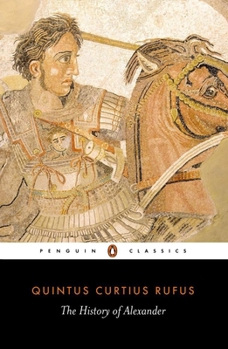The History of Alexander
Select Format
Select Condition 
Book Overview
Q. Curtius Rufus (1st century CE) is one of the most important historians of Alexander the Great. However, existing editions in use today are philologically unsatisfactory for a number of reasons, and... This description may be from another edition of this product.
Format:Paperback
Language:English
ISBN:0140444122
ISBN13:9780140444124
Release Date:November 1984
Publisher:Penguin Books
Length:352 Pages
Weight:0.55 lbs.
Dimensions:0.7" x 4.9" x 8.0"
Age Range:18 years and up
Grade Range:Postsecondary and higher
Customer Reviews
4 ratings
Rufus Rules
Published by Thriftbooks.com User , 14 years ago
A really cool book. Rufus is quite critical of Alexander at times - he describes the darker moments of his history. Obviously, not all of these stories would be true, but after reading Arrian, Rufus just seems so much more logical and believable. Rufus doesn't make a villain out of Alexander or anything, he just points out that everybody has flaws. He gives some interesting descriptions of the Persian culture - giving a Roman perspective of eastern customs. If you're writing a paper on Alexander then Rufus is a perfect counterpoint to the traditional history that people like Arrian and many modern historians tend to favour. A fun read.
The "GREATEST" OF THE "GREAT"
Published by Thriftbooks.com User , 18 years ago
Alexander the Great, was born on or around July 20, 356 B.C.E., and is my favorite personality to read about in history. To me he is the whole package general, statesman, conqueror, and philosopher. The smartest man who ever lived, Aristotle, tutored him. Alexander conquered more of the known world than any other figure in history, accomplishing all this before he dies at the ripe old age of 33. Some people called him conqueror and violent overlord. Some other called him civilizer and even God! All of them yet, called him "The Great". He was the first man in modern history that took this name, "The Great"! Even as a young boy, he shows great promise. Curtius' work is the oldest extant work available and based on eyewitness accounts. He does a better job than most in explaining the battle scenes, and seems to be more balanced in his admiration and criticism of Alexander then any of the other early biographers. I love his Bucephalus Story, and I recount it here so you get a flavor of the promise this young Alexander shows. The legend begins with Philoneicus, a Thessalian, bringing a wild horse to Philip for him to buy. None of the hands was able to handle it, and Philip grew upset at Philoneicus for bringing such an unstable horse to him. Alexander, however, publicly defied his father and claimed that he could handle the horse. The bet between Philip and Alexander was that if Alexander could ride the horse, Philip would buy it, if not, Alexander would have to pay the price of the horse, which was 13 talents, an enormous sum for a boy of Alexander's age to have. Alexander apparently noticed that the horse had been shying away from its own shadow, and so he led it gently into the sun, so that its shadow was behind it, all the while stroking it gently and whispering into its ear, (Alexander seems to be the original horse whisperer). Eventually the horse let Alexander mount him, and Alexander was able to show his equestrian skill to his father and all who were watching. The incident so impressed Alexander's father, King Philip that he told the boy "Look thee out a kingdom equal to and worthy of you, for Macedonia is too little for thee". He named the horse Bucephalus, which means Ox head, and rode it across Asia, founding a city in its honor in India after its death. This story gives you an inkling about the man. This book is a must read for students of Alexander, I also recommend Plutarch's and Arrian's work. Contemporary writers, J.F. C. Fuller and Tarn. Most of Alexander's greatest military traits are in the area of military logistics and to understand his genius in this area I highly recommend reading, "Alexander the Great and the Logistics of the Macedonian Army," by Donald W. Engels. As a retired U. S. Army Major, I recommend this book to anyone who is interested in ancient warfare, and history.
Brilliant Source
Published by Thriftbooks.com User , 22 years ago
Though not the definitive work on Alexander, Curtius provides detail not included by other sources. Sometimes hypocritical and biased, Curtius details the campaigns of Alexander with heavy focus on Alexander the person. To read this book is a must for anyone interested in Alexander. It is one of the primary sources and the fact that he is not as nice about Alexander (such as Plutarch or Arrian) may indeed do justice to the reader. This book can best be understood with the addition of Fuller's "The Generalship of Alexander The Great".
One of the Three Major Sources for Alexander's Life
Published by Thriftbooks.com User , 25 years ago
The most interesting and controversial, but not necessarily the most accurate, ancient biography of Alexander the Great. In addition to Arrian and Plutarch, you can't say you know all about Alexander until you read this book. Full of information not found in the other two biographies. Though it is often touted as not reliable, contemporary scholarship owes much of their increasingly negative opinion of Alexander the Great to this book.




